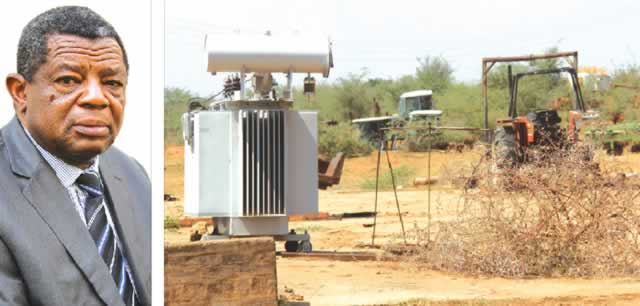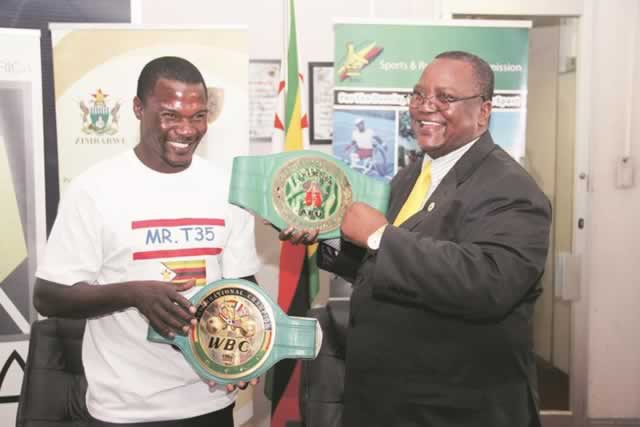Britain’s tyranny: President Mugabe’s heroic triumph

Reason Wafawarova On Thursday
Today the European Union realises the futility of Blair’s politics, and slowly but surely they now see the need to stop the meaningless fight against the people of Zimbabwe
IN a piece titled “Mugabe: Crowning of a Political Career,” also titled “President’s crowning moment” by this paper, and published on February 5 this year, I wrote that a significant number of ex-Rhodesians and white former commercial farmers were furious with former British prime minister Tony Blair and Claire Short, the overseas development minister, for their reckless reneging on commitments made to Zimbabwe at Lancaster House in 1979.
Not only are these disgruntled people bitter and angry at the betrayal, but also some are reported to have died of causes directly related to the frustration caused by their perceived losses.
One such furious person is Briton Boris Johnson, who recently wrote an article titled “Mugabe Tyranny: Britain’s shameful part” in his Telegraph column last Sunday.
He writes in the essay that a white couple who once had a commercial farm in Mazowe where they proudly kept medals for the part played by their relatives in killing Zimbabwe’s freedom fighters during the liberation war was haunted “out of their farm by sheer intimidation,” carried out by “Zanu-PF thugs.” He reveals that the couple “did not live long after this” encounter with the “land grabbers.”
Death is sad, and if this narration is correct this writer extends sincere condolences to Boris Johnson and the surviving relatives of the deceased.
So angry is Johnson that he starts his volatile essay by stating that he cannot “imagine that anyone in his right mind would actually want to go to the 91st birthday party of Robert Gabriel Mugabe.”
He is convinced, as he was during the land reclamation programme, that any African that sees any sense or logic in Mugabe’s politics is insane, absolutely out of their mind, and only fit to be described as thugs — the way he described the people he saw occupying the Mazowe farm ‘’belonging’’ to his friends.
Johnson describes a birthday party for President Mugabe as “of truly spectacular moral ugliness.” He justifies this assessment by contrasting the birthday party with the reality of poverty and starvation in the country, almost in the typical Biblical way where Jesus’ detractors accused him of wasting precious oil that in their opinion could have been sold with proceeds going to feed the poor.
The argument in the Biblical story was not about or for the poor, but against the greater ideology of Jesus Christ, and against the person of Jesus himself.
In the same way Johnson’s argument in the Mugabe birthday issue is not exactly about or for the poor in Zimbabwe, whom he regards as thugs anyway, but against what Mugabe stands for, and against his person as a political opponent of what Johnson stands for.
On June 27, 2008, the 46 664 gathered at Hyde Park in London to celebrate Nelson Mandela’s 90th birthday, and that did not in any way represent a “truly spectacular moral ugliness,” and Johnson was not in the least reminded of the starving people of Soweto in South Africa, or the many unemployed South Africans that are soon going to be reclaiming their land the way Zimbabweans did.
Of course to Johnson and his like-minded, Nelson Mandela came to London in 2008 as a heroic icon, and Mugabe comes to his own birthday party as an “ancient despot,” with 20 000 “cronies” attending his birthday party, to Johnson a far more despicable crowd compared to the 46 664 Londoners that were dancing the night away to Eddy Grant’s “Gimme Hope Joanna” on that historic London event.
To Johnson the celebration of President Mugabe’s birthday is “utterly nauseating,” and he openly asks, “Who on earth would want to be there?”
He knows for a fact that there were Zimbabweans there, and by virtue of their attendance Johnson unilaterally and summarily reduces their human status to thugs and brainwashed beings.
That behaviour is indisputably consistent with white supremacy, and nothing will convince racists like Johnson that people outside Europe can think properly.
Johnson takes a swipe at Tony Blair, and his beef with the disgraced former British Prime Minister is his failure to secure the interests of the now ousted white Zimbabwean commercial farmers.
Naturally, Johnson places all the post land reform economic problems on President Mugabe’s feet, and at no time does he perceive the economic sanctions mobilised by Tony Blair as having played a part in the economic ruin of Zimbabwe.
That also is not surprising. There are many political players in the West who believe that economic sanctions on Zimbabwe are harmless and of no purpose or effect.
To these people these are economic sanctions with a benign economic effect.
In order to convince his readers that the problems in Zimbabwe can simplistically be reduced to the selfish works of one nasty man, Johnson regurgitates the lie that President Robert Mugabe at one time bragged and called himself the “Hitler of Africa.”
Of course this is an unadulterated lie that has never been proven.
Is it not ironic that this Mugabe who is believed to be anti-white and anti-Europe could at the same time be an admirer of Europe and the white race’s worst ever character? Or is it that any massive character that is not of white origin must be emulating the feat of some dead purported similar European character?
Under Tony Blair we saw Britain’s tyranny over Zimbabwe, with the unilateral scrapping of the Lancaster House agreements, and surely Mugabe cannot be blamed for the consequences of Blair’s recklessness. Clare Short was convinced she could explain away Britain’s obligations over the land agreements, and it is not the fault of Zimbabweans or that of President Mugabe that such a simplistic approach to a delicate political matter drastically backfired.
It is not fair that Boris Johnson can say today that the behaviour of Tony Blair and his government gave President Mugabe “his pretext to launch his pogroms against the whites.”
Land occupation in 2000 was neither a pretext for anything nor was the reclamation itself “pogroms” of any politician, President Mugabe included.
We know that a pogrom is an annihilation of a genocidal nature, and to say that the 12 white framers that died during the land reclamation programme constitute some genocide is an unwarranted exaggeration only good enough to expose the relentless hate and desperation in the mind of Mr Johnson.
It is Britain’s tyranny that drove many Zimbabweans into a combative mood, and if Boris Johnson thinks any Zimbabwean that supports ZANU-PF is brainwashed or a thug then he has it all wrong.
No decent person will ever accept being bullied in their own backyard, or being subjugated to the hegemony of a racist foreign power, and Zimbabweans are no different.
Boris Johnson finds it easier to stand in the shoes of the supposedly fear-stricken Mazowe white couple trapped by singing revolutionaries at “their” farm gate, and there is no problem at all with where he places his empathies in this narration.
Johnson laments that Tony Blair did not send an invading army to Zimbabwe so it could save “our own kith and kin,” and he has the temerity to describe the former white commercial farmers as “indispensable to the economic well-being of Zimbabwe.”
At least Tony Blair was not as foolhardy as Johnson. What would an invading British army do? Stop land reclamation? Recolonise Zimbabwe? Surely not even a possibility. Zimbabweans did not liberate the country so that they could build it on the strength of an indispensable economic strength of Mr Johnson’s kith and kin.
They liberated this country so that they could build it on independent nationalism, and any indispensability that to be ever achieved must be of Zimbabwean definition, not a borrowed one from any other part of this world. Reducing every resettled black family to a supporter of President Mugabe is unnecessarily politicising a developmental social justice matter, and Boris Johnson must be accordingly reminded.
The reclamation of colonially stolen land by displaced Zimbabweans was not “the despotic confiscations” that Johnson writes about. What is despotic is for 80 percent of the country’s arable land to be in the hands of 4000 white commercial farmers in a country of 13 million people.
What Johnson needs to be reminded is that military intervention by Britain could only have achieved one thing for Zimbabwe – greater victory than the one President Robert Mugabe currently enjoys.
To Zimbabweans victory is the defence of sovereignty and country, and they view economic development as a product of political independence, not vice versa.
Zimbabweans do not see defeat in an economy ravaged by Western sanctions. Rather, they see the rising spirit of revolution, and this must answer Boris Johnson’s puzzle on why people support ZANU-PF, or even why they attend President Mugabe’s birthday party. Today the European Union realises the futility of Blair’s politics, and slowly but surely they now see the need to stop the meaningless fight against the people of Zimbabwe, and all right thinking Zimbabweans do welcome this development, as indeed does the rest of Africa. Without any shadow of doubt, Mr Johnson sees the return of white commercial farmers to Zimbabwe as a possibility, but not many people would take such illusions seriously. Zimbabwe we are one and together we will overcome. It is homeland or death!
REASON WAFAWAROVA is a political writer based in SYDNEY, Australia.










Comments